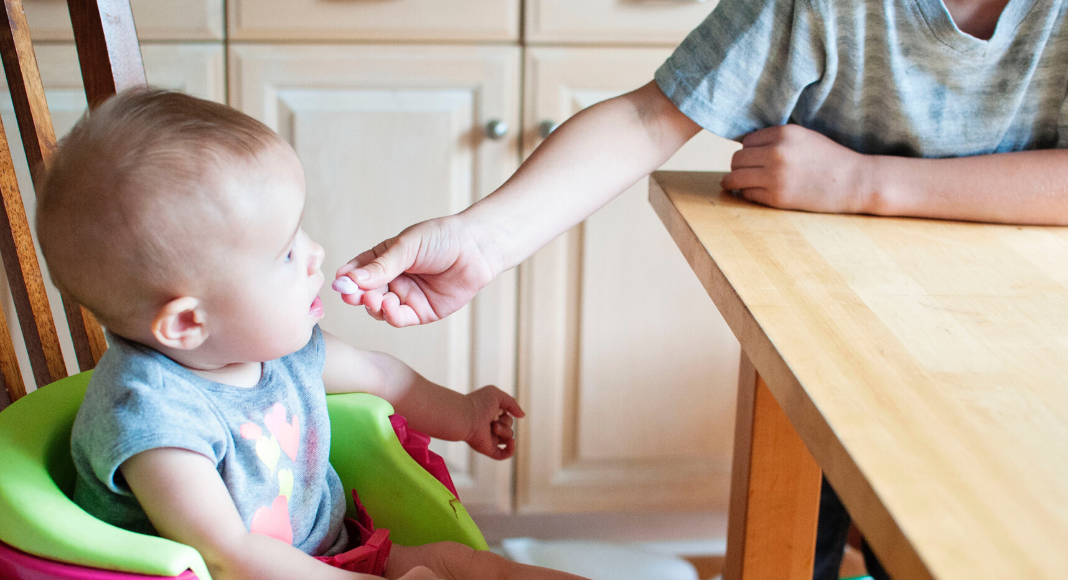I studied nutrition out in California as my first professional passion and am a certified and registered nutritional consultant (CNC/RNC). I have not practiced as a career in several years now, but it still remains a love of mine. This post is not here to preach at anyone or assume that every child is the same in their eating habits. They are not. I have friends with children that have legitimate food sensitivities or physical aversions to certain foods.

As a mother, you know your child better than anyone, and you know what is best for your child. You should always follow your instincts and any advice you have been given by a licensed physician before anything else. This post is simply to share some of the things I learned in my nutrition studies and practice – and the benefits I found in implementing some key tips with my own child a decade ago.
The first five years, but especially the first two, of children’s lives are the most key in developing their eating habits for the rest of childhood and into adulthood.
- Introduce as many foods as possible as early as possible.
- Experiment with different textures each time you reintroduce an existing food option.
- If at first one food does not succeed, try, TRY again!
- Be very strict about the eating habits you want your child to have, without variation or compromise, for the first two years.
- If you feel firmly about the healthy habits you want to instill in your child, do not let any amount of forced guilt or peer pressure sway you from your resolve.
Introduction of Foods
When you first start implementing solids (typically around 4-6 months), give your kiddo as much variety as possible. The more you introduce them to, the less likely they are to be a picky eater later in life. I did this for my daughter, and she is now a world eater – she will try anything once, and she loves Vietnamese, Sushi, Hibachi, Mediterranean, Italian, Chinese, Indian, Mexican, Caribbean, and so much more at 10 years old.
If you want to set yourself up to have a kid that will eat almost anything you put on the table in front of them as they grow up, try this method. It paid off very well for me and many other friends that did the same thing with their kids.
Texture Experimentation
The first time I gave my daughter carrots from a jar of baby food, she was not impressed! I reintroduced it with some of her cereal flakes mixed in, and she was hooked. Their little baby taste buds are evolving so quickly, you keep trying new methods until you find what sticks. And, even when what sticks one day, it is met with tears and scrunched up faces the next…
Try, TRY Again!
Please, please, please do not give up if your infant turns his/her nose up to baby peas the first time you feed him/her. You would be amazed at how putting it away in the fridge and then pulling it back out the next day magically changes everything. It was one of the hardest things for me as a new mom to feel defeated that she didn’t like a certain food, but I pushed myself to make her try it the next day and the next day until one day she loved it.
Keep switching up those textures and tastes, and eventually, you’ll have a very happy little one on your hands.
Zero Compromise 0-2
Do not become discouraged if the sweet, angelic face you helped create gives resistance to the healthy guidelines you have set. Do not grow weary and choose easy options. If it is important enough for you to set your kid up for the best chance of success with lifelong healthy habits, do what you have to even when eating out.
One of my most favorite memories after my daughter turned 2 was my mom coming to town and finally trying to “corrupt” my child with fried chicken nuggets at a fast food restaurant. My mother was way too excited to do her grandparent thing. I was so proud that my little toddler took it upon herself to peel off all the fried exterior and eat the chicken meat inside. Needless to say, my mother was very disappointed! My little girl then proceeded to steal the tomatoes and lettuce from the side salad my mom had gotten for herself.
Growing up between two households and with her getting older, I have less control than I did in those formative years, and she does not follow as strict a diet as I would like. Yet, she still has an acute awareness for what she needs to do to keep an overall healthy lifestyle that will keep her active and well. I would not change my zero compromise her first two years of life for anything, even now.
Resist the Guilt and Pressure
I firmly believed in how critical those first five years of life were in developing lifelong healthy habits, but I knew it was not realistic in my situation to control every meal she had past the age of two. My family criticized me openly and freely for my choices. At the time, most of my family was not living a healthy lifestyle and had not for the majority of their lives, so I was not interested in their opinions. I wanted something different for my child.
I also was used to this criticism since I was a child. I was the one who saw all my siblings eating huge bowls of cereal, reading the serving size on the side of the box, measuring my own cereal and milk with measuring cups, and being frustrated that I could not get them to do it with me. I was also the only one from a family of seven that remained a healthy weight all through childhood and into early adulthood. I didn’t want their results, so I simply refused to listen to their well-intentioned advice on what I should do with my own child. She was my responsibility, and the weight of that – in all aspects – was something I took quite seriously from the moment I was aware she had come into existence.
Every family/extended family is different, but I had to go so far as to tell mine that if they tried to go against my wishes and feed her anything I had not allowed that they would no longer be allowed to see her until after she turned two. That was met with some friction, but they took me seriously, and no one violated my wishes.
This will not work for every child, but these tips can put new parents at a much better advantage to avoid future picky eaters and to have kids grow up with healthy innate habits.
What did you do for your children when you first introduced solids and were met with resistance?












